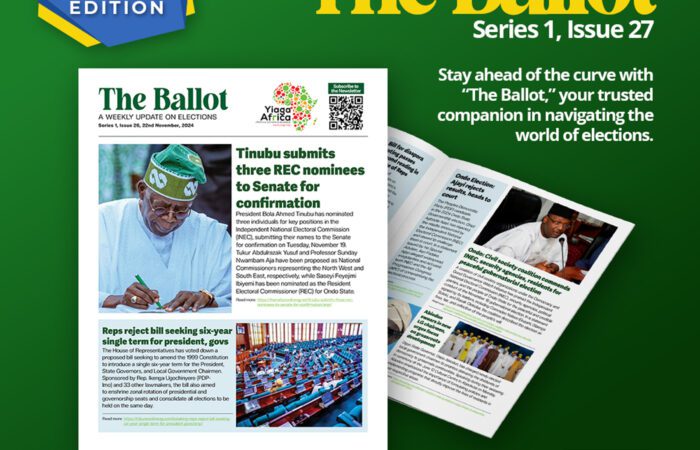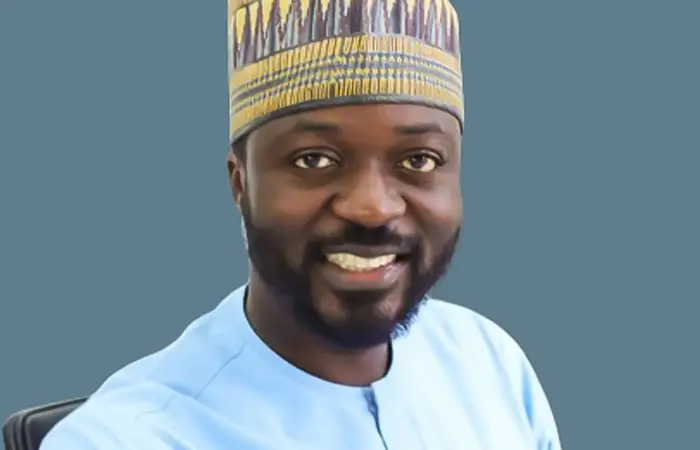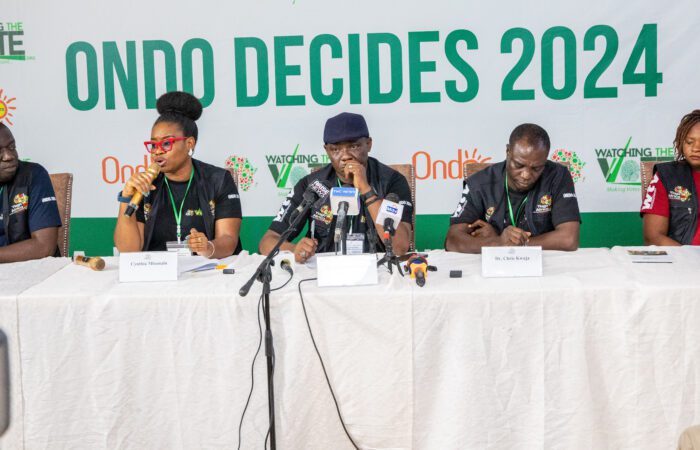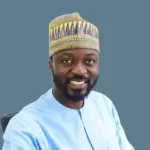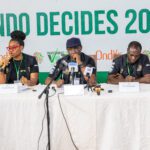The Independent National Electoral Commission (INEC), on Wednesday, August 16, announced the registration of a new political party, the African People’s Party (APP). This is in addition to the five registered in the first week of June this year. This brings the total number of registered parties to 46. In this report, we are looking at how the new parties are faring across the states.
New political parties that received their certificates of registration from the INEC nearly three months ago include the Young Progressive Party (YPP), Advanced Peoples Democratic Alliance (APDA), New Generation Party of Nigeria (NGP), All Democratic Peoples Movement (ADPM) and Action Democratic Party (ADP).
While some of them are being associated with former leaders, the actual forces behind others are yet to be unravelled. For instance, the YPP, which is being aligned with former President Olusegun Obasanjo as founder, has the following people in the registry: Comrade Bishop Amakiri, national chairman; Vidiyeno Bamaiyi, national secretary; Usman Haruna, national treasurer; Amaechi Chidi Charles, national financial secretary, and Lagi Innocent, national legal adviser.
Also, the APDA, which was reportedly registered by some forces in the Peoples Democratic Party (PDP) close to Senator Ahmed Makarfi, has Mohammed Shittu Kabiru as its national chairman; Dr. Emeka F. Okengwu as national secretary; Chief Mrs Olasinmi A, national treasurer; Margaret Seember Mchivga, national financial secretary and Mrs Augusta Eradiri as national legal adviser. The party was nearly divided into two when High Chief Raymond Dokpesi held a different National Executive Council (NEC) meeting and announced Mainasara Illo as new national chairman and Dan Nwanyanwu as new chairman of the Board of Trustees (BoT). It was the INEC that saved the situation when it said it only recognised the Kabiru-led National Working Committee (NWC).
The NGP has Dr. Yakubu Shendam as its national chairman; Alhaji Mohammed Abdu as national secretary; Alexander Naalong Danjuma, national treasurer; Alhaji Shettima Naramai, national financial secretary and Gbehe Cornelius Aondowase as national legal adviser.
Furthermore, the ADPM has Okey Chikwendu as its national chairman; Idu Agbo Emmanuel as national secretary; Abdulsalam Abdu, national treasure; Durojaiye Abdulazeez A, national financial secretary and Ojobor Ndubuisi V, national legal adviser.
The Action Democratic Party has Yagbaji V. Sani as its national chairman; Dr. James Okoroma as national secretary; Chief Declan J. Ogar as national treasurer; Salami Akeem Temitope, national financial secretary and Bichi Obadiah Joseph as national legal adviser.
But in many states, apart from the ruling All Progressives Congress (APC), the leading opposition party, the PDP; the All Progressives Grand Alliance (APGA), and the United Progressive Party (UPP), the remaining 35 registered political parties hardly exist, even in name.
With the exception of the APGA that controls Anambra State, only the APC and PDP control the executive and legislature in the remaining 36 states.
At the height of their struggle to get registered by the INEC, the five new political parties, including the latest one that joined the trail, were upbeat in not only defeating the APC and PDP, but changing the way political parties conduct their activities.
Ekiti
In Ekiti State, only three of the newly registered parties are fully operational. Those that have their secretariats in the state capital, Ado Ekiti and claimed to have presence across the 16 local governments and 177 wards are the YDP, APDA and I.D.
The state chairman of the YDP, Mr. Leye Ogunseyin, said the party arrived the state on September 2, 2016 and held its state congress, where the state executive members were elected on April 5, 2017.
According to Ogunseyin, the party has established itself in at least 10 local government areas in the state and 87 out of the 177 wards in the state.
The state chairman of the I.D, Mr. Adeyemi Adeniyi Samuel, said the party arrived Ekiti in February/March and held its state congress on August 16, attended by INEC officials, security officials and the leadership of the party. He, however, said the party was yet to have secretariats across the council areas.
The acting chairman of the APDA, Elder Tunde Agbabiaka and the publicity secretary of the party, Chief Atofarati Olusanya, said it was yet to have its state congress, adding that they slated it for March next year.
Sadly, Agbabiaka appeared as chairman following the suspension of the protem chairperson, Mrs. Foluke Okeya for an alleged misconduct bothering on anti-party activities and highhandedness. The suspension came barely a month after the party was unveiled in the state at a ceremony attended by some of its national leaders. Other allegations raised against Okeya include abuse of office, conducting herself in a manner likely to cause disaffection among party members, which they noted were capable of bringing the party to disrepute.
Ogun: Bankole’s father, others in the ADP
In Ogun State, the father of the former Speaker of the House of Representatives, Dimeji Bankole, Chief Alani Bankole, two immediate past members of the Ogun State House of Assembly and notable members of the PDP, are members of the newly formed ADP in the APC controlled-state.
Apart from the ADP, checks revealed that no other newly approved political party has made its presence felt in the state. The senior Bankole led other members from the PDP, including former House of Assembly members – Habib Ajayi, Job Akintan and Abiodun Akovoyon – to join the ADP in May.
Daily Trust on Sunday gathered that a 72-member protem executive committee, headed by Chief Wale Egunleti, was appointed to run the state chapter of the party, with Femi Sowunmi as secretary.
According to the Bauchi State secretary of the Inter-Party Advisory Council (IPAC), Musa Mato, only the ADP was registered with the body. He said the party, under its state chairman, Aliyu Mohammed Aliyu, had completed all the necessary documentation with the IPACý. Aliyu, who confirmed the existence of the party in Bauchi on telephone, also said its temporary secretariat was located along Railway area.
Edo
Among the newly registered political parties, only the APDA is visible in Edo State. The party has Roland Owie as its coordinator in the state, but it was gathered that it has no office yet.
Cross River, Sokoto, Jigawa, Borno, Kebbi, River, Benue
In Cross River State, not much has been heard about any new party as politicians have not indicated interest in anyone. Perhaps they are waiting until activities for the 2019 general elections fully commence. The most dominant parties are the APC and the PDP, where politicians are still jostling to position themselves.
At a public function recently, the deputy governor of the state, Ivara Ejemot Esu, said there was no need for additional political parties, explaining that it would have been better for the country to revert to a two-party arrangement as obtained during the General Ibrahim Babangida military administration.
However, the INEC public affairs officer in the state, Mrs. Anne Kanu, confirmed the presence of new parties, but added that people were yet to identify with them.
In Sokoto, the state secretary of the Interparty Advisory Council, Alhaji Abba Sidi, said there were 33 political parties in the state, but the five new ones were not among them. He added that only last week, the INEC in Sokoto State furnished the IPAC with the list of political parties presently existing in the state, but the five parties were not among them.
Also, the new parties are yet to arrive in Jigawa State. Speaking on the development, Malam Sani, a politician, said he hadn’t seen any politician who declared interest in any of them. He, however, said it’s a matter of time. The secretary of the state chapter of the IPAC, Sardauna Yelleman, said they had not registered any party.
In Benue State, people are not even aware that there are new political parties. The situation is the same in Borno.
Daily Trust on Sunday went round the streets of Maiduguri, the Borno State capital in search of the addresses of the new parties, but none was found. And so far, no prominent politician in the state has declared interest in any of them.
“I can tell you with certainty that so far, none of the five newly registered parties has been brought to Borno by any politician. Nobody has brought any letter to us stating the location or address of any of them, nor the phone number of its chairman, secretary or any official,’’ our source who did not want to be named disclosed at the Borno State office of the INEC.
Also speaking to our correspondent, Alhaji Ibrahim Abba El-Zubair, a high-ranking member of the ruling APC and the Buhari campaign group in the state said, “Most, if not all the five newly registered parties, are mere formations of the PDP. For example, the APDA was formed by the Makarfi group as an alternative platform in case they lost their court case against Sheriff. They were prepared to leave the PDP.
“Now that Makarfi has won the court case and is now the PDP national chairman, they have dumped the APDA. And a leading politician from the North-Central zone, who is a principal officer at the Senate, and his teeming followers, are making advances at the party as his possible alternative in case he loses his 2019 bid on the APC platform.
“The YPP is a formation of Chief Obasanjo. He formed it as an alternative platform when he observed that he was losing grip of the APC. He is not comfortable in the APC as he is not recognised as a cofounder, so he wants to clip the wings of the party and President Buhari.’’
According to El-Zubair, the newly registered parties are likely to fade away or melt into the PDP.
Anambra
In Anambra, none of the five new political parties exists for now. The APDA, which had partial presence at the height of the fight between Makarfi and Sheriff, suddenly melted into the PDP after the Supreme Court judgement.
Plateau
Daily Trust on Sunday observed that only the APDA is making strong waves in Plateau State, especially in Jos, the state capital. The deputy director, Voter Education and Publicity of the INEC in the state, Mr. Osaretin Imahiyereobo, said that only the APDA notified them of its presence.
He said, “We have a team monitoring the activities of political parties in the state; so far, only the APDA has indicated its presence. The name of its state chairman is Andrew Nanyak Daman, and it has its head office in Jos.’’ He said the other four new parties were yet to notify the INEC of their presence.
Kogi
At the moment, only the YPP and ADP could be said to have put interim executives in place. The interim secretary of the YPP in the state, Mr Olu John, said the party was working hard to open its offices across the state, as well as elect its substantive executive members.
On his part, the interim secretary of the ADP in the state, Okpanachi Jonathan, said the party was working towards electing substantive executive members. He said the party had also finalised arrangements to open offices in Lokoja and other parts of the state.
Delta
The only new party that has set up a structure in Delta State is the Young Democratic Party. A fortnight ago, the party elected officers of its state chapter at a well-attended congress witnessed by representatives of the INEC and the Delta State Independent Electoral Commission (DISIEC), security agencies and the national leadership of the party.
According to the national chairman of the party, Mrs Aye Georgina Dakpokpo, “We are not an appendage of the PDP or any other political party. Today, we have started a revolution and a movement. We believe it is time for the youth to take over the administration of this country. We are young and old enough.”
If numerical strength is the yardstick for measuring the weakness, strength, influence or quality of a democratic dispensation, then even the First Republic (1960-1966), which had 21 regional political parties, would not compete with the Fourth Republic (1999 till date), with nearly 50. The aborted Third Republic had only two political parties while the Second Republic had seven.
Notably, in the 1960s and 80s, political parties were forces to reckon with in terms of influencing policies. And the electorate could hardly be swayed by other forces. Political parties had great appeal to the electorate because they thrived on ideology, even if it was within their tribal or regional enclaves. What obtains in recent times is a clear departure from the political events of the First Republic as most parties now fizzle out as soon as they are registered.
Source: DailyTrust

